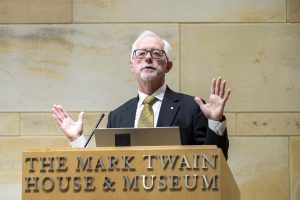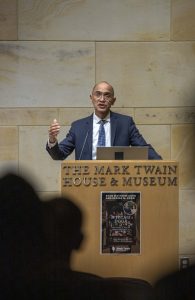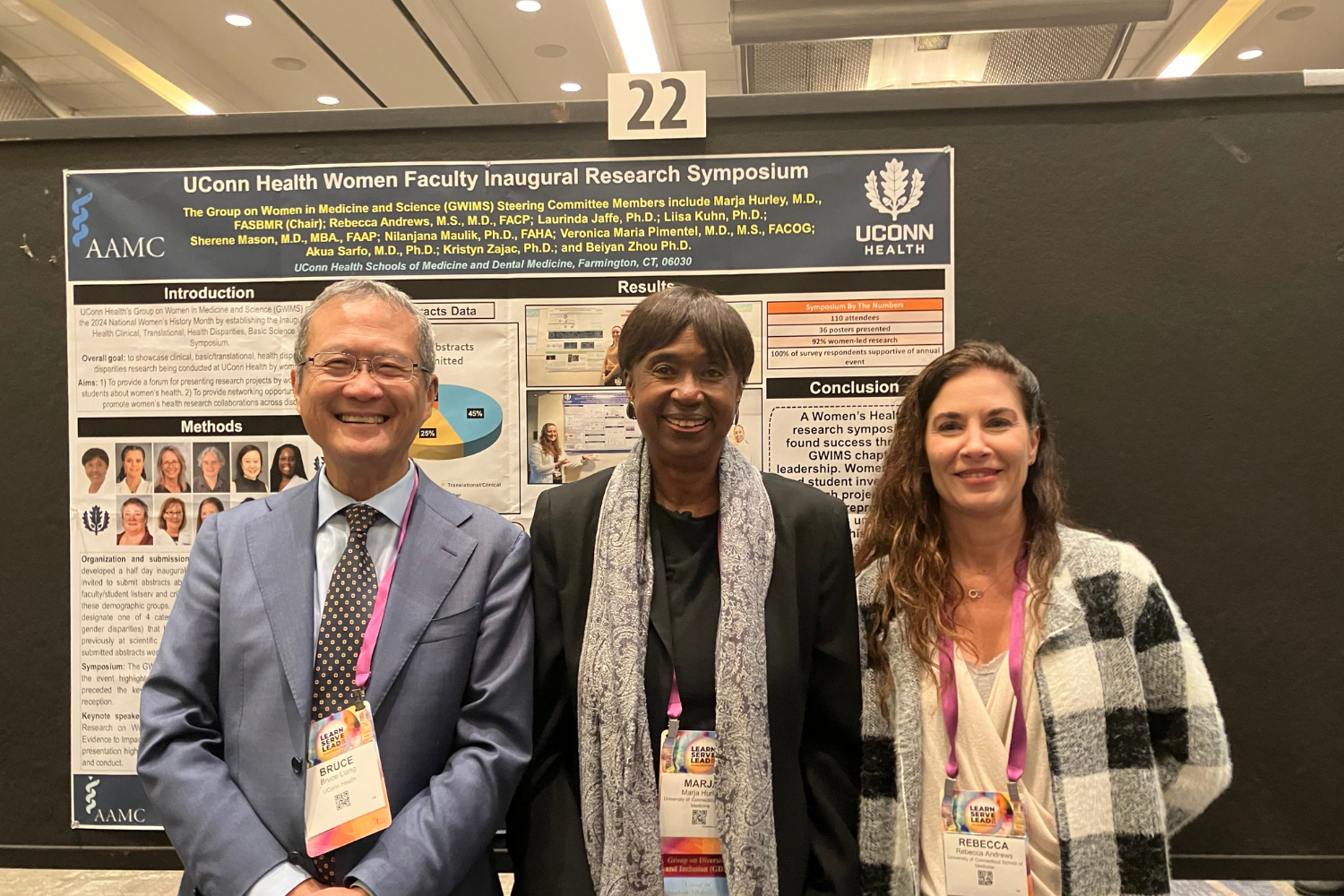The US population is growing older, and the science of aging is maturing along with it. Researchers from across the University of Connecticut, The Jackson Laboratory, and other collaborating institutions met at Mark Twain House and Conference Center in Hartford on Oct. 18 to highlight recent discoveries and honor three foundational members of the UConn Center on Aging and UConn School of Medicine.
UConn’s expertise in aging science and medicine was recently enhanced with the addition of a Claude D. Pepper Older Americans Independence Center, awarded by the National Institute on Aging (part of the National Institutes of Health.) The Pepper Center, one of only 15 such centers of excellence in the country, brings with it a $7 million grant with the goal of developing institution-wide research focused on the promotion of health and independence in older adults. The Pepper Center support is particularly focused on early-stage faculty from across different disciplines who wish to focus their academic careers on aging issues.

The University’s Pepper Center’s theme of precision gerontology “really sets UConn and its excellent, personalized geriatric care, research and academic medicine apart from the pack,” said School of Medicine Dean Dr. Bruce Liang. “Today is also very special as we remember and carry on the lasting legacies of three UConn Center on Aging and School of Medicine faculty members and their aging research—whom we lost way too soon—Dr. Janet E. McElhaney, Dr. Phil P. Smith, and most recently Dr. Kyeong Lee.”
“Janet McElhaney and I were colleagues for a long time,” and she was one of the major reasons I came to UConn Health, said immunologist Laura Haynes. Haynes gave an overview of research at the University into older adults’ immune responses to infections and vaccines, and described McElhaney’s role in the early years of the Center on Aging, when she was foundational to the development of the University’s now internationally recognized expertise in the impact of aging and frailty on vaccine responses in older adults.
Then Chris Verschoor, a researcher at Health Sciences North Research Institute in Sudbury, Ontario, presented on the most recent science to come out of his work with McElhaney before her passing. Jenna Bartley, an immunologist at UConn Health and a Pepper Scholar, then discussed the results of her research into whether metformin changed the immune responses of older people to the influenza (flu) vaccine.
“Metformin is a first-line treatment for diabetes. And it’s a potential anti-aging drug. It can treat metabolic dysfunction in non-diabetic adults,” Bartley says, which is why she tested whether it improved immune cell function after vaccination.
Finally, Kenneth Rockwood of Dalhousie University in Halifax and another former colleague of McElhaney’s gave the first invited Janet E. McElhaney Lecture in Aging Research. Rockwood discussed frailty, how it varies between older adults, and how it may impact clinical care. Some individuals become frail in their 60s while others are strong well into their 80s, reflecting great variability in the rate of biological aging between individuals.
The University had several other Pepper Scholars present research at the symposium. For example, in addition to Bartley’s work on metformin and vaccine response, Pepper Scholar Jacob Earp, assistant professor in the Department of Kinesiology discussed how aging affects muscle quality; Cutter Lindbergh, a cognitive neuropsychologist at UConn Health spoke on cognition and financial decision making in older adults; and Iman Al-Naggar, a cell biologist and translational geroscientist, discussed her studies of gerotherapeutics to improve urinary symptoms in older women. In addition to the UConn Center on Aging, current UConn Pepper Scholars have come from the departments of psychiatry, immunology, and surgery (urology) and cell biology at the School of Medicine, as well as the School of Social Work, plus the departments of Kinesiology and Nutritional Sciences in the College of Agriculture, Health and Natural Resources. This type of multidisciplinary research is urgently needed to address growing challenges in the care of older adults.
“We very much want to promote aging research across UConn, including the Storrs campus,” said UConn Center on Aging Director George Kuchel. A leadership committee is working on a plan to promote aging research in Storrs, starting with needs assessments and stakeholder input from across the university and its surrounding communities.

Pepper Centers focus on independence in older adults, but each Pepper Center must have a unique theme. UConn’s is precision gerontology. Precision gerontology seeks to understand why we all age at different rates and patterns, with different challenges and strengths. Less than a third of aging is attributable to genetics; the rest involves contributions from lifestyle and behavioral factors, as well as important socioeconomic considerations, and to some extent just pure luck. UConn’s Pepper Center seeks to develop interventions that are more effective at promoting function and independence in late life by better targeting such variability of aging including contributions from biological aging. More cross-disciplinary work will be particularly valuable for this, Kuchel said.
“This is a time of remarkable innovation in geriatric medicine and gerontology. The research presented today has the potential to influence not only our understanding of aging, but also how we approach care for older adults, ensuring they can enjoy more independence, better health and greater quality of life,” said UConn Health CEO Dr. Andy Agwunobi.


